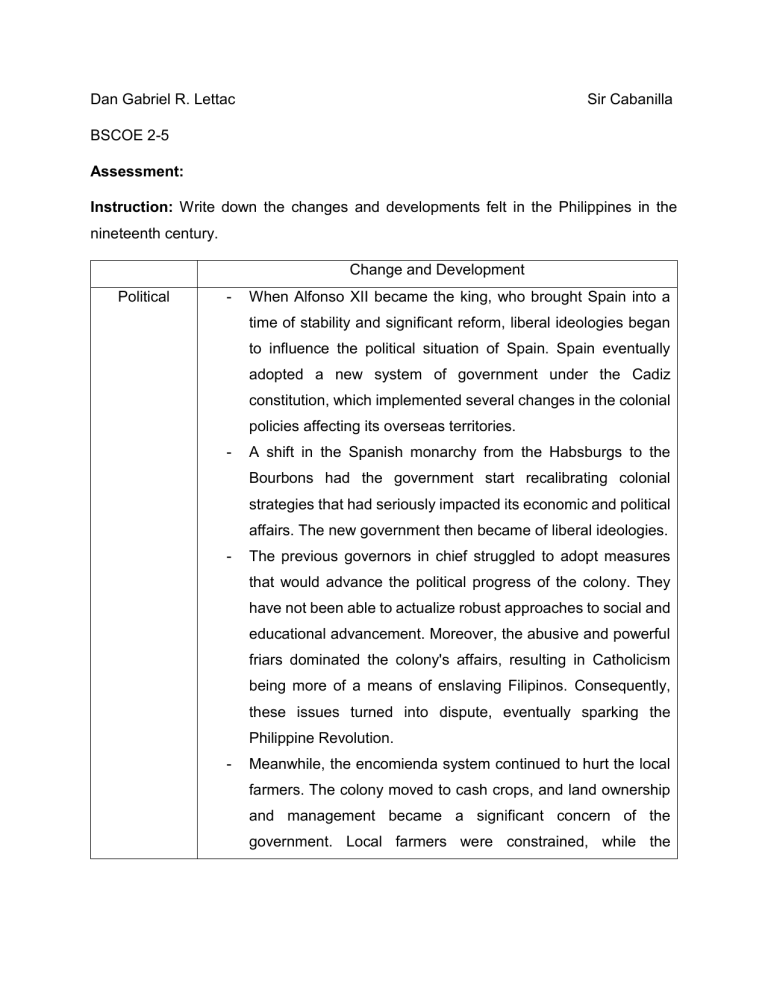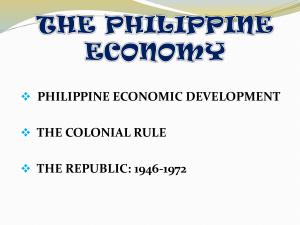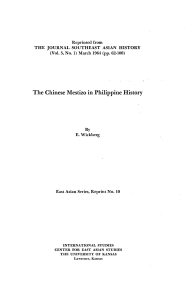19th Century Philippines: Political, Economic, Social Changes
advertisement

Dan Gabriel R. Lettac Sir Cabanilla BSCOE 2-5 Assessment: Instruction: Write down the changes and developments felt in the Philippines in the nineteenth century. Change and Development Political - When Alfonso XII became the king, who brought Spain into a time of stability and significant reform, liberal ideologies began to influence the political situation of Spain. Spain eventually adopted a new system of government under the Cadiz constitution, which implemented several changes in the colonial policies affecting its overseas territories. - A shift in the Spanish monarchy from the Habsburgs to the Bourbons had the government start recalibrating colonial strategies that had seriously impacted its economic and political affairs. The new government then became of liberal ideologies. - The previous governors in chief struggled to adopt measures that would advance the political progress of the colony. They have not been able to actualize robust approaches to social and educational advancement. Moreover, the abusive and powerful friars dominated the colony's affairs, resulting in Catholicism being more of a means of enslaving Filipinos. Consequently, these issues turned into dispute, eventually sparking the Philippine Revolution. - Meanwhile, the encomienda system continued to hurt the local farmers. The colony moved to cash crops, and land ownership and management became a significant concern of the government. Local farmers were constrained, while the hacienderos benefited solely from this development, resulting in the worst problems of land grabbing. Economic - Under the new government of liberal ideologies, GovernorGeneral Basco set up the Royal Philippine Company to fund agricultural projects and negotiate new exchanges between the Philippines and Spain and the rest of the world. Basco initiated radical economic reforms - lifting restrictions on Chinese traders that revitalized domestic trade and setting up improvements in cash crop farming, among others - that helped the Philippines to succeed in the global export economy. - The abolition of the Manila-Acapulco trade forced Spain to create trade ties with other nations, resulting in the re-opening of Manila to world trade for easier transactions. - The opening of the Port of Manila led to immense socioeconomic changes in the Philippine colony - it became one of the best trading cities on its shores, attracting merchants across nations with high demand for export products, such as rice and tobacco. Despite economic constraints, the success of numerous industries and institutions has prompted foreign investors to try their fortune in the Philippines, giving enormous profits to Filipino entrepreneurs and Chinese immigrants. - Modern production and transport methods have opened up economic development as trade, mainly agricultural, becomes increasingly more effective. An entirely new class emerged as a result of the expansion of commercial agriculture, alongside the land estates of the Church and the pre-Spanish nobles of coffee, hemp, and sugar haciendas, which frequently were the property of enterprising Chinese-Filipino mestizos. Some of these families played a substantial role in the economic and political campaigns of the Philippines. The Philippine economy rose rapidly, and its local industries evolved to meet the increasing demands of Europe that were industrializing. - The Chinese and Chinese Mestizos were two groups that benefited greatly from the economy's development. The Spanish were dubious of the Chinese's true motives as traders due to the Chinese settlement boom in the Philippines. These prompted the Spaniards to impose an unjust policy on sangleys, extending from higher cost, limiting the development and movement of their products in the Parian, to actual arrangements for ejection. The Chinese still became an integral part of the Philippine economy and society. They have a significant role in contributing to the strengthening of the economy. Manila became a feasible occasion for individuals seeking a better chance or those seeking to get down from the compounding condition in the farmlands. Socio-cultural - Governor-General Carlos Maria dela Torre initiated changes, such as abolishing flagging as a penalty in the Spanish army for Filipino deserters, abolishing press censorship, and encouraging freedom of speech. - In education, a decree was passed in 1863 instructing the founding of schools in various places and mandating Indios to learn Spanish as the national language. Eventually, the insulares, Chinese mestizos and indios started to identify as Filipinos, contributing to national identity. - Meanwhile, the journey from Europe to Asia became shorter and faster, leading to the influx of western liberal ideologies to the Philippines. The minds of the Filipinos learned the ideas of independence, freedom and solidarity. - As a result of substantial economic shifts in the lives of Filipinos, a middle class of Asian-Eurasian mestizos has arisen in the Philippine social group. They founded an elite social community consisting of former governors, minor indigenous bureaucrats, decorated workers and schoolmasters. In particular, the wealth of the principalia, the inquilinos, came from the income produced by land owned or leased. The Inquilinos, or land trustees, filled the crucial role of local farmers and significantly contributed to the social representation of the countryside as it widened the wealth inequalities between natives and the landowners from the encomienda system. References: Unit Three: The Nineteenth Century Philippines. Lesson 3: The Philippine’s Economic, Social and Political conditions during the Spanish Colonization until the 19th century as Rizal’s context.


